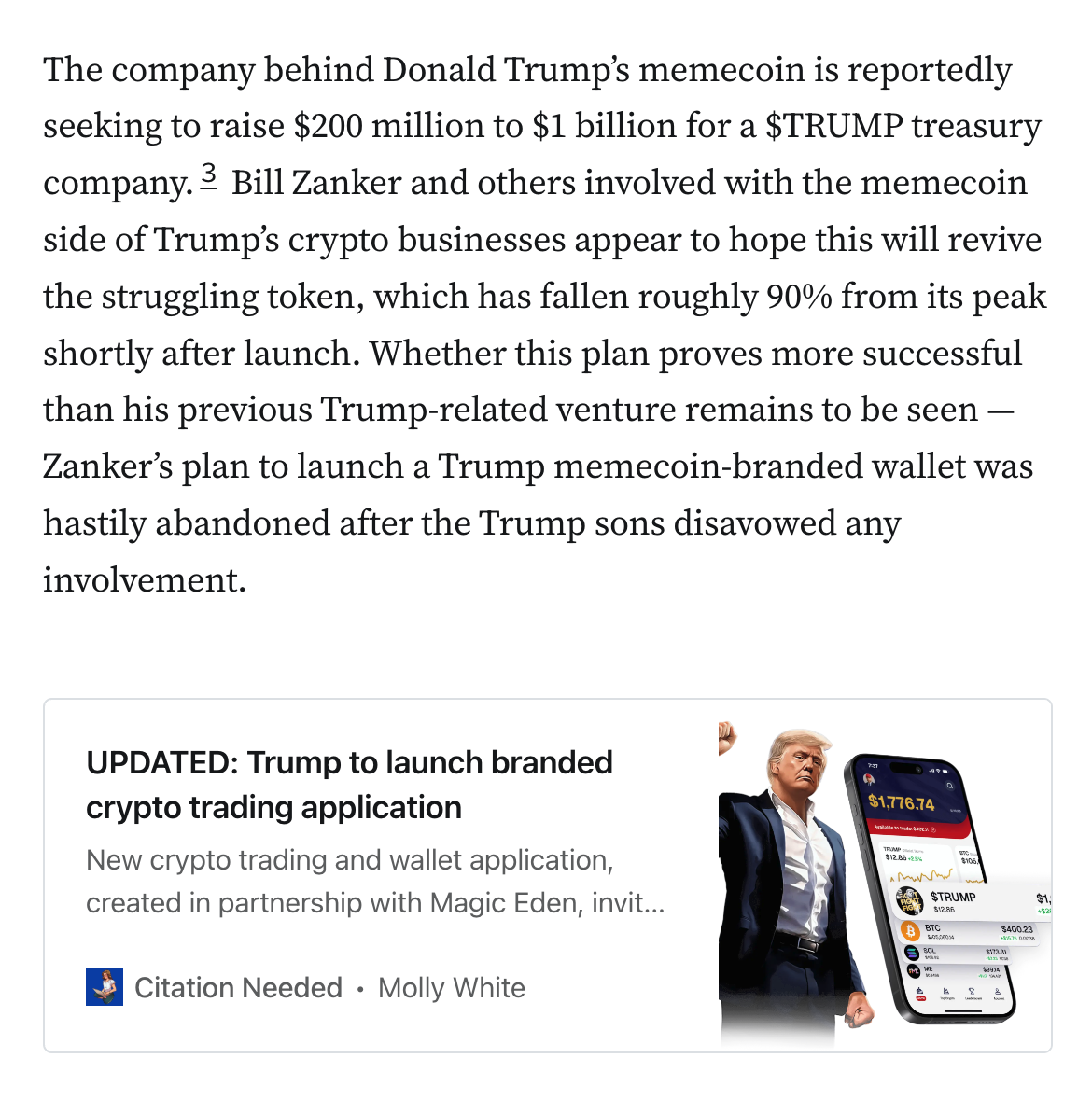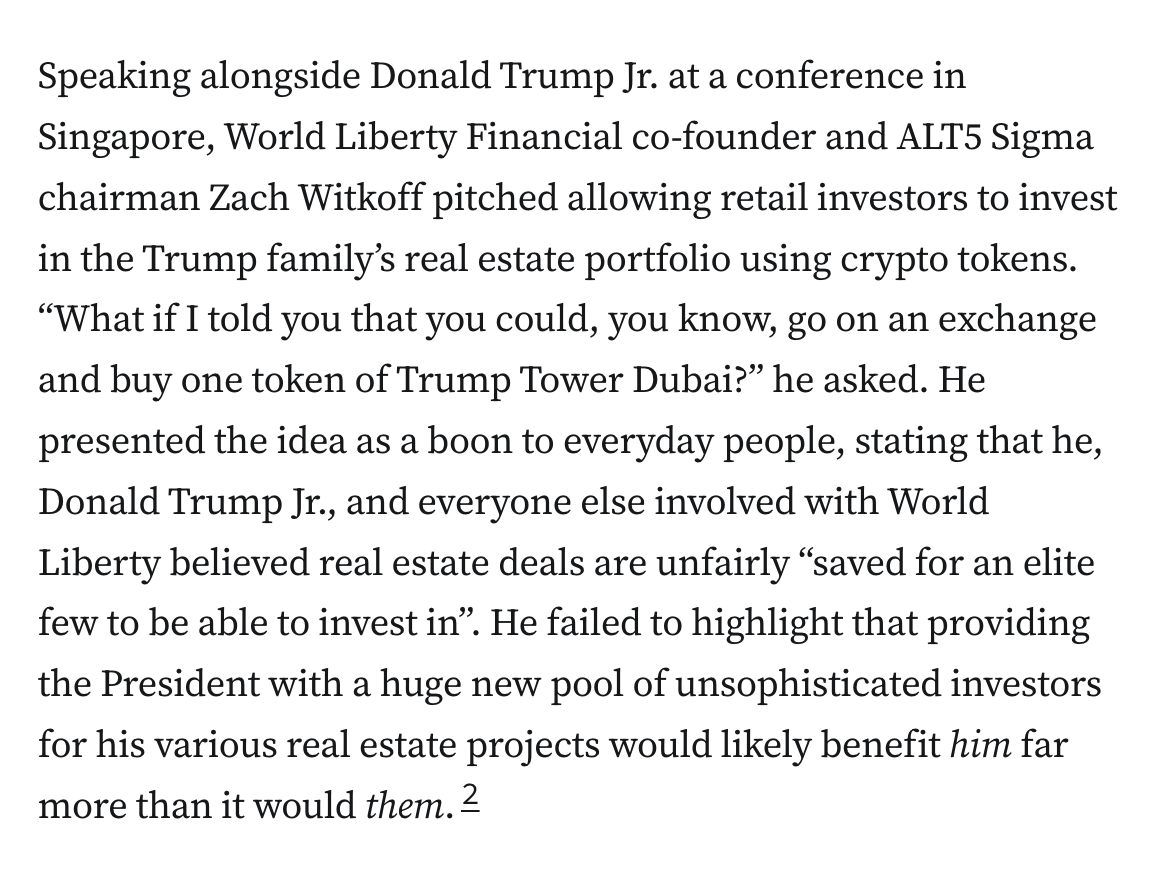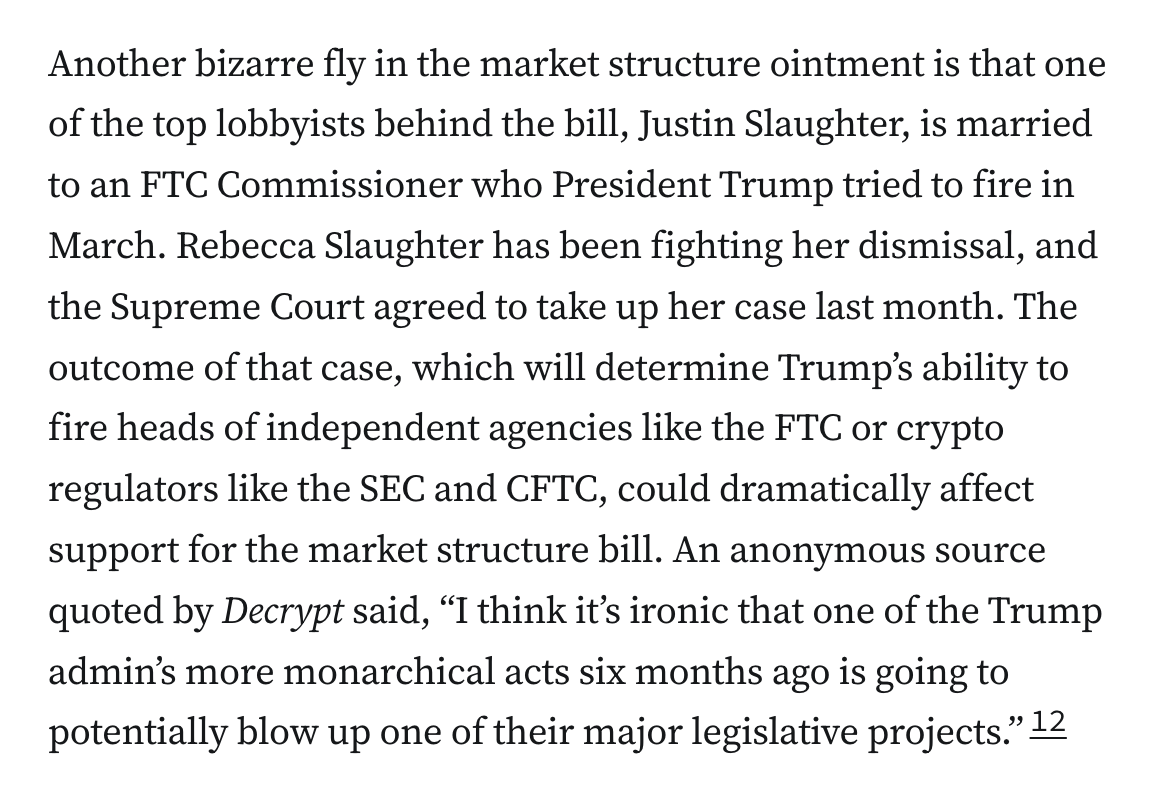The SEC has had to remind crypto treasury companies that insider trading isn’t allowed in SEC-regulated markets just because crypto is involved... at least in theory.
Discussion
@molly0xfff I generally don't think we should fully conflate Trump, his $ETH based $TRUMP "coin" and Bitcoin $BTC. Even with that said i do believe he is using blockchains to get bribes.
@MeaningfulBits who’s conflating $TRUMP and BTC?
@molly0xfff not saying you specifically are but the general public 💯 percent does. They see "crypto""BTC""ETH""$trump" as interchangeable. I'd personally like to see more public account tagging and blockchain forensics as I'm sure some kind of crime is happening with the Melania coin (and others) you mentioned. My concern is that if someone does prove something fishy will it ever make it to court?
$5 says he told that guy "I'm a huge fan. I loved the Beatles."
Last issue, I wrote about how the Emirati firm that handed Trump and his family nine-figure crypto profits scored a huge win with an AI chip deal. Now they’re getting 15% of TikTok, too.
Trump stands to profit even more if his business partner, Zach Witkoff, achieves his dreams of soliciting investments in Trump real estate properties using crypto. He pitches it as a win for the everyman, leaving out that it would be a much bigger win for Trump’s wallet.
The team behind Trump’s memecoin is considering launching a $TRUMP treasury company. If it happens, it would likely mark a second Trump-linked token/treasury company operation riddled with conflicts of interest, where the same people sit on both sides of the deal.
![If realized, this would be the Trump-related second treasury firm with serious conflicts of interest in its management. ALT5 Sigma, a Nasdaq-listed company that pivoted to a WLFI treasury company, added several of World Liberty Financial’s executives to its board. A similar structure, where the treasury company shares leadership with the company that issues the token held in treasury, would suffer from similar issues: executives responsible for managing the treasury company would also stand to benefit from decisions that inflate the token’s value or promote its use, rather than from prudent management. This conflict was so blatant that the Nasdaq forced Eric Trump’s removal from the planned board of ALT5 Sigma, though other World Liberty executives were still allowed to take leadership and board positions [I92]. A $TRUMP treasury company would certainly benefit President Trump, whose businesses control 80% of the $TRUMP token supply and will require a liquid market to sell those holdings. If the same individuals are involved in both the token-issuing entity and the treasury company, they would effectively be negotiating with themselves — able to set whatever price they wish for the tokens the treasury purchases.](https://media.hachyderm.io/media_attachments/files/115/340/536/732/713/940/original/0820831bdb41b992.png)

US president third rugpull #crypto scam.
Great businessman, the greatest many people say!
@molly0xfff you seem confused and I suspect you might be an alien. All humans know the rules do not ever apply to the rich and famous for they are not fashioned of this kingdom of humanity. Why some mages and ancients even believe the rich and famous have spirits that shine brighter than a mere mortals. 😊 Glad I could clarify :)
Trump has officially pulled Brian Quintenz’s CFTC Chair nomination after he refused to be the Winklevoss twins’ bulldog.
“They completely nuked him. They made a phone call. They were like, ‘This is not going to fly with us.’ And it was a very short trip from there to [the nomination] being killed.”
@molly0xfff a16z vs. Winklevi civil war?
America’s largest union federation, AFL-CIO, has opposed proposed crypto market legislation as “the perfect environment for the next financial crisis to germinate”. Whether anyone’s read the letter yet is another question, because the shutdown is stalling legislative work.
The crypto bill faces an awkward snag — its top lobbyist is married to the FTC Commissioner Trump tried to fire.
“I think it’s ironic that one of the Trump admin’s more monarchical acts six months ago is going to potentially blow up one of their major legislative projects.”
bonfire.cafe
A space for Bonfire maintainers and contributors to communicate
![SEC
Despite being almost completely neutered by the Trump administration, even today’s SEC can’t turn a blind eye to some business that’s simply too shady. The SEC and the Financial Industry Regulatory Authority (FINRA) have reportedly contacted some of the more than 200 companies that have found new life as crypto treasury companies this year. Many of these companies made a dramatic pivot to crypto (such as Justin Sun’s Tron treasury company, which previously sold theme park merchandise [I86]), and in some cases their stock prices moved substantially as they unveiled their new plans. The SEC and FINRA have noted, however, that in some of these cases, trading activity and stock prices spiked in the days prior to the announcement, leading the agencies to write to the firms to underscore that selectively disclosing material non-public information violates Regulation Fair Disclosure. Such communications often signal the beginning of an investigation or insider trading enforcement action, though it’s not clear if they do in this case.15](https://media.hachyderm.io/media_attachments/files/115/340/553/022/170/387/original/dc64a6b24522bea9.png)
![Trump business interests
Hot on the heels of New York Times reporting about questionable timing in deals involving the Trump family’s World Liberty Financial and Emirati firm MGX [I93], The Washington Post has published related reporting focused on MGX’s upcoming 15% stake in the TikTok deal brokered by the Trump administration. Senator Warren (D-MA), who had already demanded an ethics investigation into the World Liberty and MGX deals, has stated that the “shady Abu Dhabi firm” had “already cut deals to get sensitive American technology while enriching the Trump family’s crypto firm. The American people deserve to know if the President has struck another backdoor deal for this billionaire takeover of TikTok.” A White House official has said that MGX’s investment profiting the Trump family crypto project had no bearing on the MGX deals, so... case closed, I guess?
Some have raised separate concerns about the TikTok deal, wondering if it’s a scheme to benefit the Trump allies who will take ownership of the firm. Vice President Vance’s recent statement that the firm was valued at only around $14 billion — a fraction of the $100 billion that one analyst previously estimated for the app — has led some to speculate that the company was intentionally undervalued to allow new investors to profit from an artificially large increase in value. Senator Wyden also commented on the arrangement, stating that “By steering TikTok to allies like Larry Ellison and a fund backed by the United](https://media.hachyderm.io/media_attachments/files/115/340/532/160/406/345/original/c9d4f1ce5276532c.png)

![In the White House
After rumors that the Trump administration was considering new candidates to replace Brian Quintenz as their nominee for CFTC chair [I93], the White House has withdrawn his nomination. Politico remarked on the “stunning turn of events for a nominee who once appeared to be a lock for confirmation”, writing that the incident was an “illustration of the new balance of power in Trump’s Washington” as the Winklevoss twins pressured President Trump to rescind his nomination.5 Quintenz has alleged that the Winklevosses might have “misled” Trump, publishing text messages with the brothers that he said he believed “make it clear what they were after from me, and what I refused to promise.” [I92] An anonymous source quoted by crypto outlet DL News, who they described as “familiar with discussions surrounding the CFTC nomination process”, stated, “They completely nuked him. They made a phone call. They were like, ‘This is not going to fly with us.’ And it was a very short trip from there to [Quintenz’s nomination] being killed.”6 The Winklevosses are not the only ones happy to see Quintenz out of the running, though. Dina Titus (D-NV), the co-chair of the Congressional Gaming Caucus who had called for an investigation into possible ethics violations by Quintenz pertaining to prediction markets [I90], responded to the news of the withdrawn nomination by writing, “Good. The CFTC deserves strong, independent leadership that will follow and enforce agency regulations.”7](https://media.hachyderm.io/media_attachments/files/115/340/540/074/185/275/original/853681c11d8c043d.png)
![In Congress
The AFL-CIO, the largest federation of US unions, has slammed proposed crypto market structure legislation in a letter to the Senate Banking Committee. They write, “As drafted, this bill will enable the crypto industry to operate in wider and deeper ways in our financial system without sufficient oversight or meaningful safeguards.” They urge Senators to oppose the proposed bill, citing concerns that it will poorly regulate assets that may be incorporated into pension funds, and that it would increase financial instability. “This legislation provides the perfect environment for the next financial crisis to germinate,” they write.11
Whether anyone’s actually read the letter is unclear, as the government enters its second week of shutdown. With many congressional staff furloughed and legislative business largely stalled, the shutdown has thrown a wrench in the crypto industry’s hopes to get market structure legislation expeditiously passed into law. The industry had been pushing for quick passage before midterm campaigning begins and before a potentially less crypto-friendly Congress could make their preferred rules more challenging to implement [I84, 85].](https://media.hachyderm.io/media_attachments/files/115/340/541/911/658/730/original/965bc1800f9b5ba2.png)
